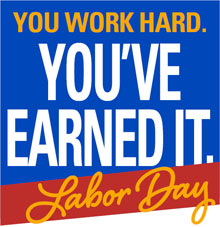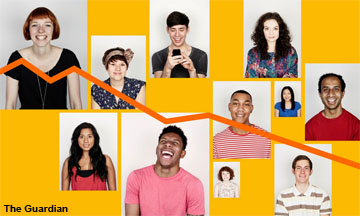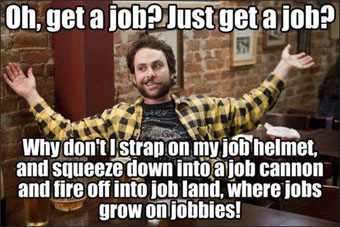OPINION
Poor millennials. Seriously. They’re poorer than us.
By DAVID GROVES
 (Sept. 2, 2016) — Labor Day is a time to reflect upon the contributions of the people who make this nation work. And no, Mr. Trump, I’m not talking about you and your billionaire “job creator” buddies.
(Sept. 2, 2016) — Labor Day is a time to reflect upon the contributions of the people who make this nation work. And no, Mr. Trump, I’m not talking about you and your billionaire “job creator” buddies.
I mean the folks who care for us when we are old or sick. The people who build and maintain roads, airplanes, office buildings, bridges and tunnels. The women and men working to keep our families and communities safe, teach our children, grow and harvest our food, and provide critical public services.
It’s no secret that the working-class Americans we celebrate this Labor Day are struggling to maintain their quality of life. Growing inequality is well-documented. Decades of trickle-down policymaking — both by conservatives (tax cuts for the rich) and neoliberals (free trade and pro-corporate globalization) — have dramatically failed us.
But the rising inequality I want to highlight this Labor Day — one that should be of particular concern to those of us in the Puget Sound Advocates for Retirement Action — is the growing disparity of wealth between generations.
If we think we’ve got it bad, our children have it worse.
Millennials, those young adults who are now between the ages of 15 and 33, are facing a perfect storm of joblessness, under-employment, debt and shrinking incomes that amount to an absolute economic betrayal. And not just in the United States. Thanks to globalization, it’s happening throughout the Western industrialized world.
 Using data from the Luxembourg Income Study, the largest database of international incomes in the world, an investigation by The Guardian found that in Australia, Britain, Canada, France, Germany, Italy, Spain and the U.S., prosperity has plummeted for young adults:
Using data from the Luxembourg Income Study, the largest database of international incomes in the world, an investigation by The Guardian found that in Australia, Britain, Canada, France, Germany, Italy, Spain and the U.S., prosperity has plummeted for young adults:
“Where 30 years ago young adults used to earn more than national averages, now in many countries they have slumped to earning as much as 20% below their average compatriot. Pensioners by comparison have seen income soar… It is likely to be the first time in industrialised history, save for periods of war or natural disaster, that the incomes of young adults have fallen so far when compared with the rest of society.”
In the U.S., in particular, the data shows that under-30s are — for the first time since anybody began keeping track of such things — poorer than retired people. They are on a course to become the first generation to make less money (in real terms) than their parents.
Now, there are “kids today” grumps out there who are convinced millennials are narcissistic, lazy and entitled. Of course, their parents thought the same of them. This dates all the way back to Kennewick Man thinking Kennewick Boy couldn’t hunt-and-gather for shit.
 But surely, even the grumpiest of grumps wouldn’t suggest an international wave of sloth and entitlement has deprived an entire generation of their share of prosperity. No, this was not caused by Twitter, selfies, or even by war or natural disaster. This disaster is man-made.
But surely, even the grumpiest of grumps wouldn’t suggest an international wave of sloth and entitlement has deprived an entire generation of their share of prosperity. No, this was not caused by Twitter, selfies, or even by war or natural disaster. This disaster is man-made.
No matter what policies and trends you blame, the bottom line is that the same jobs are not paying as much as they did when previous generations had them. Wealth is shifting away from young adults not just to the 1% we are so inclined to berate, but to us.
Experts warn that this trend has grave implications for everyone in terms of social cohesion and family formation. Who’s going to help take care of us like we (hopefully) took care of our parents?
So this Labor Day, while we honor the contributions of all working people, let’s not forget the youngest among us. They’re often working multiple jobs, burdened by enormous educational debt and, yes, may be living in their parents’ basement.
But it’s no joke. It’s an international crisis.
David Groves is Editor of The Stand. This column originally appeared in the September 2016 edition of The Retiree Advocate, the monthly publication of the Puget Sound Advocates for Retirement Action. It is posted here with the author’s reluctant permission.





